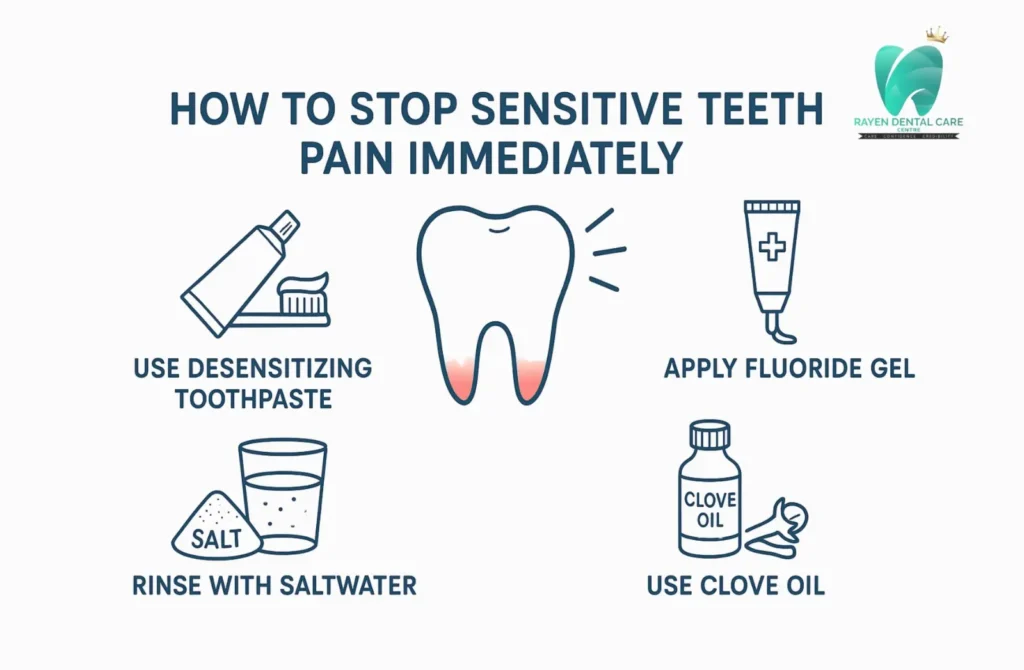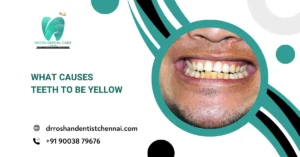How to stop sensitive teeth pain immediately is a question many people ask when sharp discomfort strikes after a sip of cold water or a bite of something sweet. Sensitive teeth pain occurs when the protective enamel on your teeth wears down or when gums recede, exposing the underlying dentin. This layer contains tiny tubules that lead to nerve endings, triggering sudden pain in response to temperature changes or certain foods. It’s more than just uncomfortable—it can interfere with your daily activities. Understanding what causes this sensation is key to finding fast, effective relief.
Why are My Teeth Sensitive?
- Worn Enamel and Exposed Dentin: Enamel erosion due to acidic foods, aggressive brushing, or teeth grinding can expose the dentin layer, which contains tiny nerve pathways. This leads to sensations like sharp pain when eating or drinking, especially when looking for ways on how to stop sensitive teeth pain immediately.
- Gum Recession: When gums pull away from the teeth, they expose the root surfaces that lack protective enamel. This exposure can make a tooth sensitive to cold but not hot, especially during early-stage gum recession where only certain triggers cause discomfort.
- Cracked or Chipped Teeth: Small fractures in the teeth can expose the dentin or even the pulp. These cracks may allow cold substances to reach the nerve, making the tooth sensitive to cold but not hot in many cases.
- Tooth Whitening or Dental Procedures: Recent whitening treatments or dental work can temporarily irritate nerves inside the teeth. If you’re dealing with this discomfort, understanding how to stop sensitive teeth pain immediately can help minimize the irritation and prevent further aggravation.
- Tooth Decay Near the Gum Line: Cavities that form close to the gum line can wear through enamel and reach the sensitive dentin layer. These areas are often more reactive to cold, making people search for ways on how to treat cold sensitive teeth effectively and prevent worsening discomfort.
- Acid Reflux or Frequent Vomiting: Conditions like GERD or eating disorders can cause stomach acid to repeatedly enter the mouth, leading to enamel erosion over time. This exposes the nerves underneath, often prompting the need to explore how to stop sensitive teeth pain immediately with both dental care and medical support.

Tooth Sensitivity Prevention
- Use Desensitizing Toothpaste: Specialized toothpastes contain compounds like potassium nitrate or stannous fluoride that block pain signals from reaching the nerve. This is one of the most effective methods when considering how to stop sensitive teeth pain immediately.
- Adopt a Gentle Brushing Technique: Brushing too hard or using a hard-bristled toothbrush can wear down enamel and irritate the gums. Switching to a soft-bristled brush and brushing in gentle, circular motions can help treat cold sensitive teeth and prevent further enamel erosion.
- Limit Acidic and Sugary Foods: Beverages and foods high in acid, such as soda, citrus, or vinegar-based dressings, can erode enamel. Reducing their intake is a long-term strategy on how to stop sensitive teeth pain immediately by protecting the tooth surface.
- Treat Underlying Dental Conditions Promptly: Issues like gum disease, cavities, or cracked teeth can lead to sensitivity if not managed early. Seeking timely treatment is crucial in knowing how to treat cold sensitive teeth before the discomfort worsens.
Home Remedies for Sensitive Teeth
- Salt Water Rinse: Rinsing with warm salt water can reduce inflammation and kill bacteria around sensitive areas. This natural disinfectant helps as a quick home remedy for toothache due to cold and promotes healing of irritated gums.
- Clove Oil Application: Clove oil contains eugenol, a natural anesthetic and anti-inflammatory agent. Applying a few drops to the sensitive tooth can numb pain quickly, offering an effective solution on how to stop sensitive teeth pain immediately at home.
- Desensitizing Toothpaste and Coconut Oil Pulling: Using desensitizing toothpaste daily combined with oil pulling using coconut oil can strengthen enamel and reduce nerve exposure. This combination works well as a home remedy for toothache due to cold and helps calm tooth sensitivity over time.
- Avoid Extreme Temperatures in Food and Drinks: Sudden temperature changes can trigger pain in sensitive teeth. Preventing these triggers is part of how to stop sensitive teeth pain immediately and can support long-term relief.
- Green Tea Rinse: Green tea is rich in antioxidants and has natural anti-inflammatory properties. Rinsing your mouth with unsweetened green tea twice a day can help reduce gum inflammation and strengthen teeth, making it a helpful addition when exploring how to stop sensitive teeth pain immediately.
- Guava Leaves Chew or Rinse: Guava leaves have antimicrobial, anti-inflammatory, and pain-relieving properties. Chewing fresh leaves or boiling them in water for use as a rinse can soothe sensitivity and act as a natural home remedy for toothache due to cold, offering comfort without side effects.. Preventing these triggers is part of how to stop sensitive teeth pain immediately and can support long-term relief.
What happens if you don’t treat it?
| Potential Issue | Explanation |
| Worsening Pain and Discomfort | Ignoring sensitivity can lead to constant discomfort even from mild triggers like breathing in cold air. Learning how to stop sensitive teeth pain immediately becomes more difficult as the condition progresses. |
| Increased Risk of Tooth Decay | Exposed dentin is more vulnerable to decay, which can spread deeper into the tooth. Knowing how to treat cold sensitive teeth early on can prevent costly dental procedures later. |
| Gum Recession and Inflammation | Untreated sensitivity may be linked to gum disease, causing gums to recede further and worsen the issue. This makes it harder to manage pain without immediate attention to how to stop sensitive teeth pain immediately. |
| Tooth Infection or Abscess Formation | Long-term neglect can allow bacteria to penetrate the pulp, leading to infection or abscess. Proper care and early action on how to treat cold sensitive teeth can avoid root canals or extractions. |
Conclusion
Understanding how to stop sensitive teeth pain immediately starts with identifying the root cause—whether it’s enamel erosion, gum recession, or dental damage. Quick relief methods like using desensitizing toothpaste, clove oil, and salt water rinses can ease discomfort, but long-term care is equally important. Preventive steps such as gentle brushing, limiting acidic foods, and addressing dental issues early can protect your teeth from further sensitivity. Taking action not only improves your comfort but also supports lasting oral health.




